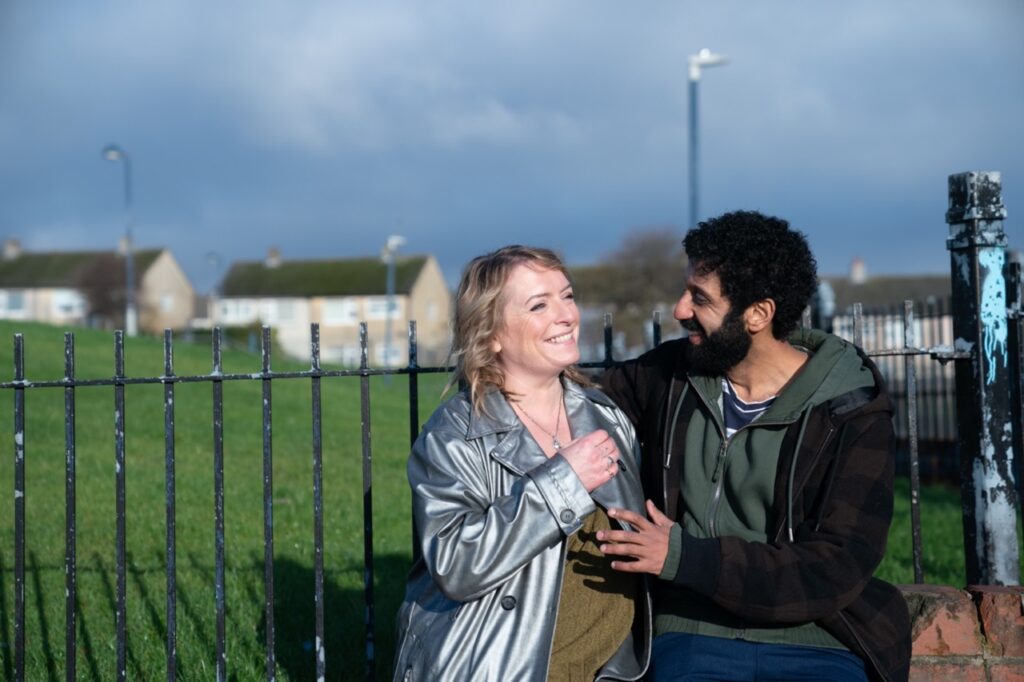Clio Barnard’s first feature-length documentary film, “The Arbor,” received The Douglas Hickox Award at the BIFAs, Best British Newcomer and the Sutherland Award at the BFI London Film Festival, Best New Documentary Filmmaker at Tribeca, and a BAFTA nomination for Outstanding Debut. Her second feature, “The Selfish Giant,” premiered as part of Cannes Director’s Fortnight 2013, where it won the Europa Cinema Label Award for Best European Film. It was nominated for a BAFTA for Outstanding British Film. A BFI Screenwriting Fellowship recipient, Barnard is also the director of “Dark River,” starring Ruth Wilson, which premiered at TIFF 2017, and the TV adaptation of “The Essex Serpent,” starring Claire Danes.
“Ali & Ava” opened in NYC July 29 and is rolling out to additional cities today, August 5.
W&H: Describe the film for us in your own words.
CB: “Ali & Ava” is a love story about two people who are both lonely despite being surrounded by people they love. Set over a lunar month, Ali and Ava are a catalyst for change in each other’s lives.
W&H: What drew you to this story?
CB: I met two people who inspired me — Rio, who the character of Ava is inspired by, and Moey Hassan, who the character of Ali is based on — while making my previous films “The Selfish Giant” and “The Arbor.” The film is also a love song to the city of Bradford — I wanted to make a film that celebrates the city.
W&H: What do you want people to think about after they watch the film?
CB: I want people to come out of the cinema wanting to dance on top of a car! I want people to leave the cinema with a strong sense of possibility and a feeling of joy. Adeel [Akhtar, who plays Ali] and I talked about joy as an act of resistance.
W&H: What was the biggest challenge in making the film?
CB: The film touches on some difficult subject matter but I didn’t want it to be heavy-handed, so finding that balance was a big challenge.
W&H: How did you get your film funded? Share some insights into how you got the film made.
CB: The film was funded by BBC Films, the British Film Institute, and Screen Yorkshire.
W&H: What inspired you to become a filmmaker?
CB: I’m from a visual arts background and started using a 16mm hand-wound Bolex to make records of charcoal drawings as they changed, and fell in love with celluloid. I loved watching film when I was growing up — “Performance” by Nicolas Roeg and “Rashomon” by Akira Kurowsawa made a big impression when I was a teenager.
W&H: What’s the best and worst advice you’ve received?
CB: The best advice was cast well and crew well.
The worst advice was to get a proper job — I was told by an ex that it was unrealistic to think I could make a living making films.
W&H: What advice do you have for other women directors?
CB: Your voice is needed — we want to hear the stories you want to tell, told in the way you want to tell them.
W&H: Name your favorite woman-directed film and why.
CB: This is difficult to answer because there are so many. If I’m forced to choose, I would say “Vagabond” by Agnès Varda because it was made in the mid ’80s, when a film directed by a woman was a rarity, and it’s a brilliant film that mixes drama and documentary elements with a great central performance and great structure.
W&H: What, if any, responsibilities do you think storytellers have to confront the tumult in the world, from the pandemic to the loss of abortion rights and systemic violence?
CB: Yes, I do think storytellers have responsibilities to respond to the tumult in the world.
W&H: The film industry has a long history of underrepresenting people of color onscreen and behind the scenes and reinforcing — and creating — negative stereotypes. What actions do you think need to be taken to make it more inclusive?
CB: Yes, there is an urgent need to have many more people of color in all areas of the film industry. In the U.K., people of color make up three percent of the workforce in the film industry despite being 17 percent of the population and 40 percent of London’s population — where the majority of the workforce is based — so there really needs to be a big push to address racial inequality in the film industry.
There needs to be positive action from everyone, at all levels, in all organizations; those in positions of power need to recognize the problem and recruit people of color to be the gatekeepers — commissioners and executive producers — to really effect change as well as addressing inequality in terms of writers/directors/producers onscreen and behind the camera.
We can all play a part in pushing for and bringing about positive change.







